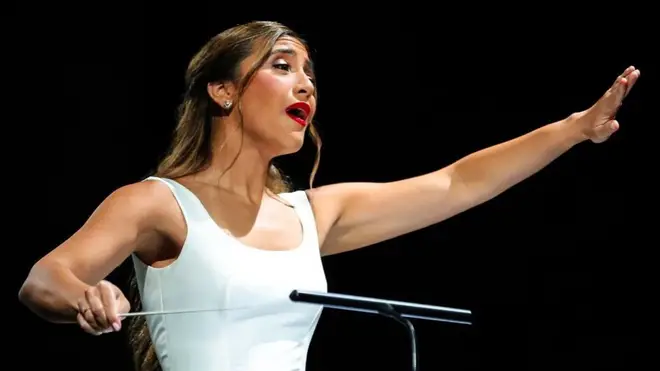On Air Now
Calm Classics with Myleene Klass 10pm - 1am
20 October 2021, 11:38 | Updated: 20 October 2021, 17:04

Dubai Expo 2020 has brought together 50 musicians from 23 nationalities to create the all-female ensemble, Firdaus Orchestra.
The Firdaus Orchestra is a trailblazing, all-female orchestra that wants to show young girls they can have a career in music.
The ensemble is based at the Firdaus (meaning ‘paradise’ in Arabic) Studio, a permanent fixture at the Dubai World Expo’s 4.38km2 site.
The project has brought together 50 musicians from 23 nationalities across the Arab region, and alongside the studio, is the brainchild of Oscar-winning Indian composer A.R. Rahman.
First seen at the opening ceremony to the Dubai World Expo 2020, which was delayed by a year due to the coronavirus pandemic, the orchestra will have their debut ‘space-themed’ concert on 23 October 2021.
Read More: Afghanistan’s all-female orchestra flees as the country’s music scene remains under threat
The orchestra represents a diverse group of musicians with the youngest performer aged just 15, and the oldest aged 51.
Noura Sulaiman, a spokeswoman for the ensemble, shared her experience of the “spirit of sisterhood” which encompassed the orchestra’s rehearsals.
“Everyone was so collaborative, there was no competitiveness. They all wanted to help each other.
“The great thing about the orchestra is that we have a balanced mix of abilities. So, you can naturally see a spirit of mentorship come through.”
While female musicians are more represented in the West than in past generations, for girls wishing to pursue music as a career in the Middle East and North Africa (MENA), there are still traditional barriers and stereotypes they have to break through.
The Nielsen insights showed that around 60 percent of aspiring female artists still feel stigmatised for pursuing a career in music, and one in two aspiring female artists say they are advised against the career path.
Half of all labels surveyed in the insights believed that the ratio of female to male Arab artists had declined in the last 10 years due to sociocultural restrictions and female stereotyping. A quarter of the aspiring artists surveyed believe female stereotyping is making it difficult for them to break into the music industry.
Multiple media outlets have reported a ‘mass exodus’ of promising young female talent from MENA, due to these restrictions and stereotypes.
Read More: 10 women who changed the classical music world forever
Born and raised in Beirut, Lebanon, the ensemble’s conductor, Yasmina Sabbah, developed a passion for music at an early age, singing in choirs from the age of 7.
After an undergraduate in Graphic Design, she came to the UK to study for a Masters in Music in Choral Conducting at the University of Cambridge. She is one of the few active women conductors in the Middle East region.
“At the end of the day, if you’re a good musician – that’s that. It doesn’t matter if you’re male or female,” says Shabbah,
“The point of having an all-female orchestra is to send a message of empowerment across the world. A message that really strives to break the stereotypes associated with women in this region – fostering an open and inclusive mindset – through the power of music.”
Sabbah encourages young musicians aspiring for a career in music to go for it, in an inspiring Instagram post (see above).
A teaser trailer introducing the orchestra and narrated by A.R. Rahman shows the ensemble performing Mozart’s Turkish March.
However, this arrangement will be unlike the version most western audiences have become accustomed to, as the orchestra features Arabic and Indian instruments alongside those found in a western classical orchestra.
These instruments include the qanun, a traditional Middle Eastern stringed instrument; the buzuq, a long-necked fretted lute; the ney, an ancient, end-blown flute which has been played for 4500-5000 years; the oud, a short-necked, pear-shaped, fretless stringed instrument belonging to the lute family; and the sitar, a plucked stringed instrument originating from the Indian subcontinent.
Sulaiman says this mixture of instruments was deliberate. “The best part of working with so many nationalities is the different perspectives they all bring – the different flavours of how they learned their instruments and what kind of music they listen to,” he said.
“We have a violinist from France, who’s originally Moroccan. She plays the violin in a classical way but can also play the traditional Andalusian and Moroccan style.”
Read More: If Beethoven was born in Baghdad? This middle-eastern ‘Für Elise’ is too infectious for words

Expo 2020 Dubai and A.R. Rahman Present Firdaus Orchestra
Expo attendees can watch the orchestra’s first performance as part of the Dubai Expo 2020 ticket price on the Jubilee Stage at the end of October.
The ensemble is excited to make its full-concert debut, and for many of the younger musicians in the orchestra, the concert and subsequent performances at the Expo will be their first professional music engagements.
For musician Ariel Azarian, who plays percussion in the orchestra, this opportunity is “life-changing” and “a dream come true.”
She says, “The fact that [I get to perform] at the Expo, with an all-female group is just out of this world. It is a privilege, and I'm just really excited to be a part of this.”